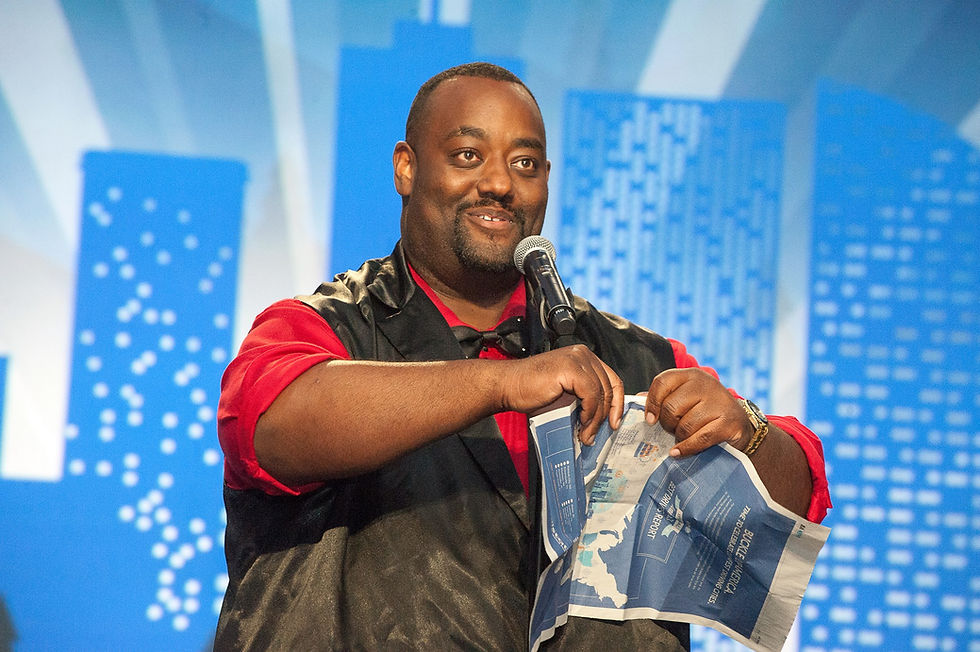Corporate Comedian and Magician Dewayne Hill Featured in Forbes
(Snippets and Highlights from the original article. Full article link below)

FORBES - May 1, 2020
By Abram Brown
In their 20-year careers, Doug McKenzie and Ryan Oakes, a pair of professional magicians, have made many things disappear: cell phones, doves, watches, silk handkerchiefs, rings, dollar bills, computers, people. Then in March something else vanished quite unexpectedly. Their entire business.
Within days, they emerged with an outline of “Alakazoom,” a 20- to 45-minute, virtual version of their act done, yes, through Zoom’s video-conference app.
“There is digital conferencing fatigue. We’re trying to provide a service that at least lightens that fatigue,” says McKenzie. “Our show is interactive, and right now, what we’re missing is human contact. We’re trying to bring that—really make an experience that’s not like you could be watching YouTube and see the same thing.”
We’re all pretty tired of seeing the same things, doing the same things—stuck as we are at home living out the same daily rhythms. Everyone is a bit strung out. And a laugh these days can seem as scarce as five-ply Charmin.
At the outset of lockdown, our calendars filled up with virtual happy hours and simultaneous Netflix viewings. Seven weeks later, those ideas have gotten stale, and digital gatherings are quickly evolving again. Increasingly, gig entertainers are being hired to perform at virtual parties often arranged by coworkers or groups of friends. “I found it very entertaining,” says Michael Bolognino, the Google executive.

Magicians are only one genre of virtual performer. With the world ill at ease, comedians are especially popular. “I’ve performed for people in California, in Oregon, in New York,” says Dewayne Hill, a Tampa, Florida, funnyman. “It’s cool that I’m able to do it and don’t have to leave home.” Other top acts include mind readers, illusionists, jugglers and ventriloquists like Atlanta’s Willie Brown. “People love it—you don’t get a chance to see a ventriloquist that often,” says Brown, 57. “And it’s just like TV coming right at you.”
Hill, the comedian in Tampa, is finding times tough, too. Pre-pandemic, Hill, 41, stuck mostly to the corporate event circuit, charging $2,500 to $3,000 an outing. “And they would hand me the check after the show happily,” he says. In the new marketplace, Hill has been getting only $300, but now it’s more likely executives, not their employers, paying the bill. That was the case recently for shows he did for teams at Berkshire Hathaway HomeServices (the real estate arm of Warren Buffett’s conglomerate) and Royal Bank of Canada. “They wanted me to come in and just break up the monotony of them sitting at their computer screens,” Hill says.
They are also shortening their routines. Hill has cut his down by a quarter to less than 40 minutes in his case—to account for shortened, at-home attention spans. And he has begged audiences to break digital etiquette by unmuting their mics to help recreate some semblance of a live show. He still does dress the same: red button-down, black leather vest, gigantic Rolex Yacht-Master. “I want them to give the same feel as if they were live. It’s my responsibility as a professional entertainer.”
Abram Brown is a senior editor at Forbes, where he covers social media, influencers—and every other way we communicate digitally. In the past, he directed Forbes.com's features coverage and edited across Forbes magazine. As a writer, he has reported from three continents—from the mines of Nigeria to the mansions of Greenwich. He has worked on over a dozen Forbes lists, profiled the 63rd, 153rd, and 478th richest person in the world, and once spent a delightful evening discussing murder mysteries over 25-year-old scotch with (top-earning author) James Patterson. Both men drink Macallan, and both believe the butler really did do it.





























Comentários